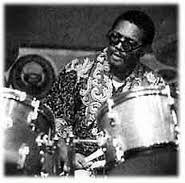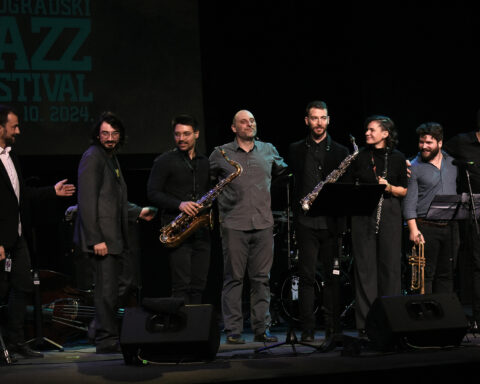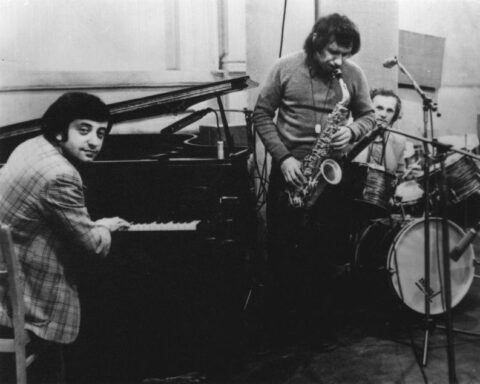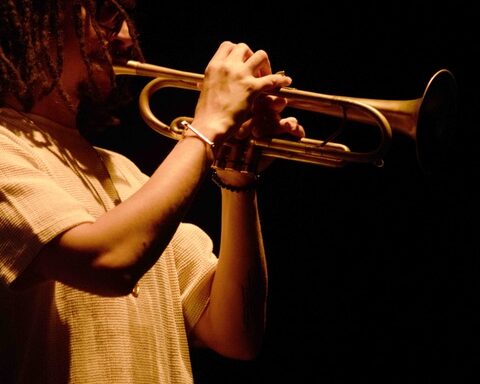Frances Blackwell, widow of drumming great Ed Blackwell, wants to produce a biography of her husband, who died in 1992.

She has the story but knows she’s not a writer with the discipline, sense of structure and publishing ambitions to complete a book, so she’s searching for a co-author to help her put together an “as-told-to.” It’s a job for a jazz journalist.
Yes, a job — and her search isn’t unique or even unusual in the jazz world today. Successes in finding able collaborators has recently produced strong results. Pianist Randy Weston’s autobiography African Rhythms on its front cover reports “composed by Randy Weston, arranged by Willard Jenkins,” JJA member and former vice-president. I Walked With Giants, the autobiography of Jimmy Heath, has as its cover author credit, “Jimmy Heath and Joseph McLaren.” Other recent examples include Wynton Marsalis’s Moving to Higher Ground “with Geoffrey Ward,” Lullabye of Birdland, The Autobiography of George Shearing “with Alyn Shipton,” and Paul deBarros’ upcoming bio of Marian McPartland, done with her participation. Michelle Mercer’s authorized biography of Wayne Shorter Footprints was not an as-told-to, involved a hundred independent interviews by Mercer and included her insights and analysis, but benefitted from the access and cooperation Shorter allowed, and his encouragement.
It has long been so. Although Louis Armstrong really wrote his own Satchmo and Swing That Music, his pal clarinetist Mezz Mezzrow “authored” his bio Really The Blues only with the enormous help of Bernard Wolfe (who had been Leon Trotsky’s secretary). Nat Hentoff provided literary services, uncredited to bassist Charles Mingus to turn his manuscript into Beneath The Underdog. Laurie Pepper put her husband Art Pepper’s story into print in Straight Life and David Ritz has carved out a significant career “ghosting” or serving as the ear in “as-told-to” books by/about Ray Charles, Aretha Franklin and Jimmy Scott, as well as Walter Yetnikoff, Don Rickles, Tavis Smiley and Lang Lang.
The elements of interviewing/oral history-gathering that has traditionally been a staple of jazz journalists makes this sort of interaction with musicians and those close to them seem natural. And to write a book with/about a beloved musician can be a dream for jazz journalists. But getting a book completed and published aren’t simple or straightforward processes. There are many challenges along the way.
- Firstly, the buying market for biographies of jazz musicians is limited. Players who may be legends to fans frequently are unknown to editors and their sales forces. The current publishers of most books on jazz are university presses, which typically pay advances to small to cover living expenses during time needed to research and write books, even if the main material is delivered in an organized, concise yet vividly detailed and dramatic manner by a single star interviewee.
- Secondly, there are issues of privacy and/or candor, and sometimes of music or lyric rights, to be negotiated. Whose story is it, really? Maybe this is not be a concern when a ghost is working on commission, but if the “arranger” is actually an author trying to get a high degree of reality and comprehensiveness in a book by a recalcitrant artist, conflict may arise.
- Third, and perhaps most important: the business side of a celebrity-author collaboration is a major matter for consideration. This, too, goes to “Whose story is it, really?” The interviewee or his/her representative tells the story, but the writer puts gives it form that’s publishable. Who gets what credit and what’s the financial split? This must be established from the start.
These issues may not seem pertinent to artists and their kinfolk who simply (they imagine) want a scribe. Frances Blackwell writes:
As to the goal of the book, it is a love story of our experiences together, weathering the storms of racism and prejudice, and rise above it all as champions of divine love, being in the midst of all the innovations of Jazz and its early years. similar to the ’40s with Charlie Parker and Dizzy.., even the boycott of the Newport Jazz Festival, what a first hand experience, and I was there, too!… I envision the book to be a loving revelation of who he [Blackwell] was as a man, how he lived his life with integrity on a daily basis, and how he with his illness and against all odds, continually played and inspired others. No matter how he was feeling, even if he had to be carried on the stage, when he set down behind his drums, music miracles happened.
Given this synopsis, an Ed Blackwell biography does sound compelling. Other jazz musicians — Billie Higgins? Mal Waldron? Don Cherry? — may have comparably fascinating stories; in fact, jazz journalism is based on the notion that the stories of all these musicians are fascinating and worth preserving. Still Blackwell’s may be particularly significant, and here’s the love of his life, eager to tell his tale.
But make no mistake: A sensitive, knowledgable, patient and insightful person is needed to spend the time, energy and interest to listen to Frances’ recollections, help sort the wheat from the chaff, ask for further info when necessary, contextualize material that may be too close to its provider(s) for her (them) to be able to do so, clarify issues the complexities of which are unrecognized by that info provider, research and certify matters of fact, polish the prose — then pitch the book to an agent (or more likely, directly to publishers), receive the rejection letters, keep at it until the project finds a home, perhaps negotiate the contract, work through the various stages of the printing process, promote and help market the book.
It may be more time and cost-efficient for everyone, intended audience included, to set up a video camera and record full length interviews of Frances and other survivors of Blackwell’s circle. The love and high regard Mrs. Blackwell sustains for her late husband, and her fascination with the jazz scene he was such a magnificent part of, will shine through.
Yet the dream of a book includes the assumption of its permanence.To apply to be Frances Blackwell’s scribe, Ed Blackwell’s biographer, start by contacting Frances’ friend DrJasonPSchwartz@yahoo.com. Then listen to Blackwell at his best — in Ornette Coleman’s quartet, in every combination with Don Cherry, leading his own sessions or with Eric Dolphy, Archie Shepp, the American Jazz Quintet, in Old and New Dreams, etc. Next, imagine the joys and be realistic about the difficulties of what you want to get into. Finally, decide if you can commit to such a project for the long haul.






if it wasn't for ed and paul motian we may never had avante garde and free jazz drummers. these men
and their brilliance were the template for today's top players to learn from and advance the language.
I would take nothing away from Edward Blackwell and Paul Motian -- but must commend Max Roach for being at the base of more expansive concepts of drumming even earlier.
Ed Blackwell definitely needs more recognition, I believe Max Roach was his first influence but he took that much further with Ornette, Don Cherry then his own bands in the 80's. Musicians all know about his contribution but his name belongs next to all the other modern jazz greats.
From a musical standpoint, I have made some transcriptions of his playing for my own interest but I am not a biographer. I hope Mrs Blackwell finds an honest and capable writer to tell her and Ed's story and a publisher to make it available for the world.